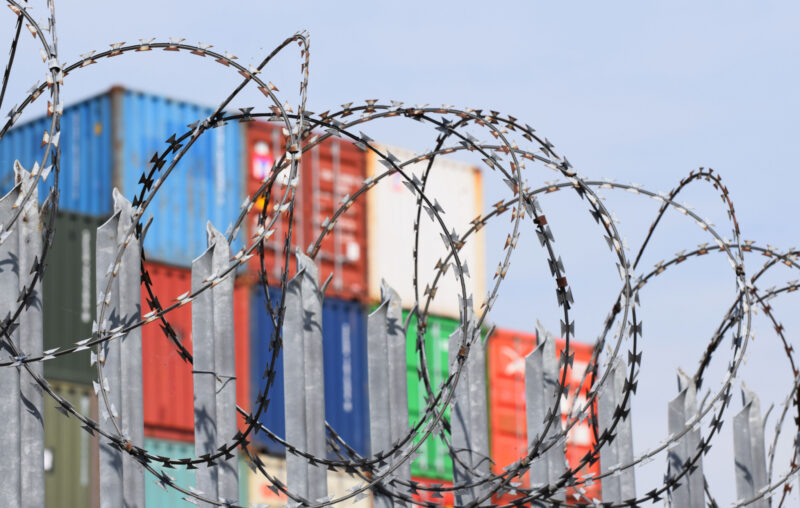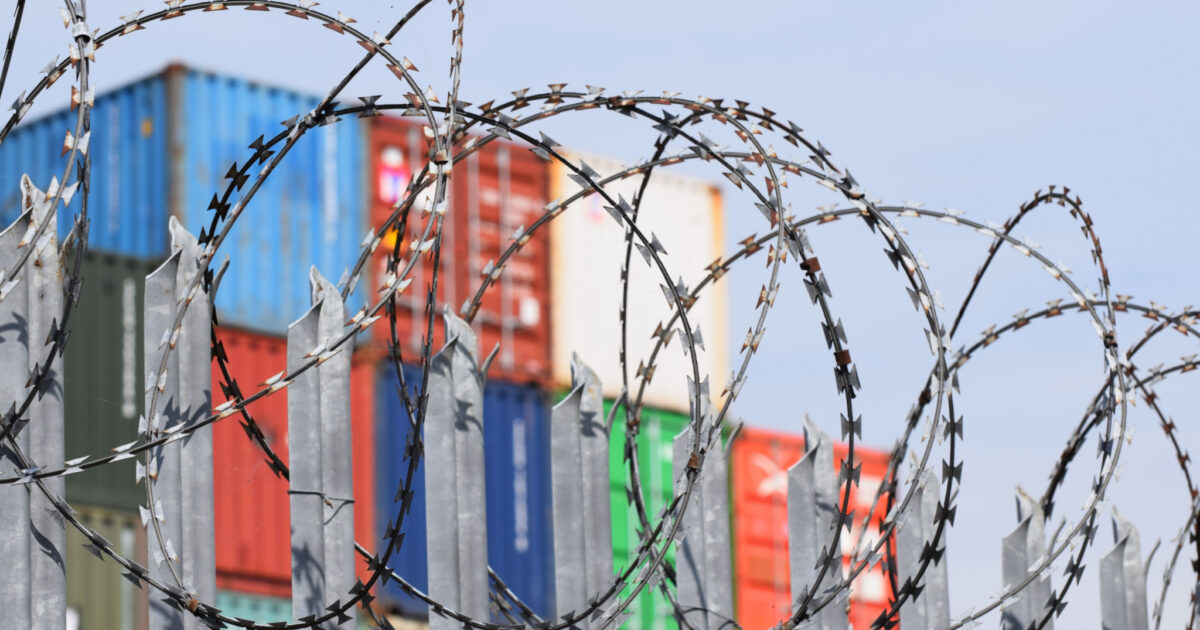
After many years of advocating free commerce, a rising share of Republicans need to return the celebration to the protectionism that as soon as outlined it. This sensibility, popularized by former President Donald Trump, echoes the economically unlearned fretting with which generations of politicians and lobbyists rationalized commerce limitations. After prolifically introducing tariffs when in workplace, Trump has proposed a sweeping 10-percent tariff on imports. This, assuming regular import ranges, would quantity to a roughly $300-billion annual tax enhance on People.
The GOP’s rediscovered protectionism displays transient political (and sometimes aesthetic) sensibilities greater than any financial actuality. Trump and likeminded populists typically allege that free commerce has chased American manufacturing jobs to international international locations. “Some folks in our nation bought wealthy, our industrial base bought hollowed out,” Florida Gov. Ron DeSantis (one other tariff-friendly Republican) stated of America’s relationship with China, on the celebration’s second presidential major debate.
Worldwide commerce has enriched People vastly, and Trump’s commerce battle with China largely failed to attain its objectives and pummeled the home financial system. Whereas some beforehand American jobs have, certainly, emigrated to nations with decrease labor prices, the mythologized disintegration of America’s manufacturing belt occurred extra because of automation, union malfeasance, and different elements.
The GOP’s pivot recollects a bygone period, and equally previous — and older — arguments can rebut Republican arguments. Economists have, for hundreds of years, debunked shoddy protectionist theories. As free commerce between people advantages the transacting events mutually, so too does commerce between nations.
In his 1776 basic, The Wealth of Nations, Scottish economist Adam Smith noticed that “All…discover it for his or her curiosity to make use of their entire trade in a method wherein they’ve some benefit over their neighbours, and to buy…no matter else they’ve event for.”
Like all tax, tariffs artificially elevate shopper costs, thus “defending” home producers from international opponents providing the identical items cheaper. Smith acknowledges the apparent: “If the produce of home will be introduced there as low-cost as that of international trade, the regulation is evidently ineffective,” he argues. “If it can not, it should usually be hurtful.” Right here, Smith continues, private finance can clarify worldwide commerce, writing, “It’s the maxim of each prudent grasp of a household by no means to try to make at house what it would price him extra to make than to purchase.”
Economics issues the allocation of scarce assets which have various makes use of. Authorities misdirection of assets leeches financial productiveness regardless of coverage makers’ rosy guarantees. Tariffs power home shoppers to pay extra for items, harming particularly these companies that lie downstream in protected industries’ provide chains. “The trade of the nation…is thus turned away from a extra, to a much less advantageous employment, and the exchangeable worth of its annual produce, as a substitute of being elevated, based on the intention of the lawgiver, should essentially be diminished by each such regulation,” Smith writes.
Regardless of Smith’s — and lots of others’ — erudition, politicians have lengthy supported protectionism, typically for his or her private electoral profit. Protectionism, nonetheless, has persistently revealed itself to be economically nonsensical.
And up to date expertise has not differed.
Trump’s protectionist measures, of which Joe Biden has stored many, demonstrably harmed these American companies whose enter prices they inflated. The Worldwide Commerce Fee reviewed Trump’s Part 232 and 301 tariffs, reporting that People absorbed nearly the entire of those tariffs’ price. “Tariffs injury financial well-being and result in a internet loss in manufacturing and jobs and decrease ranges of earnings,” writes the Tax Basis’s Erica York. She estimates that forty fifth and forty sixth Presidents’ tariffs will dampen long-term GDP and wages by 0.21 p.c and 0.14 p.c, respectively. Different international locations’ retaliatory tariffs will, furthermore, “additional cut back US GDP by 0.04 p.c and get rid of 29,000 full-time equal jobs,” she states.
Some Republicans’ obvious assumption that the American financial system would profit if American firms operated totally inside the US badly misperceives the essential realities of globalized commerce. Overseas expansions usually are available in extra (not in place) of home operations. Most US firms with international manufacturing vegetation additionally function home ones. “Analysis…finds that few multinationals enhance hiring overseas and reduce their US headcount (which might point out international employees are changing American ones),” writes Scott Lincicome, vp of normal economics and commerce on the Cato Institute. The identical is true of producing funding, Lincicome provides.
Forcibly reshoring American trade would threaten an immense quantity of productiveness. US companies that manufacture transnationally comprise solely 0.5 p.c of all American manufactures. They nonetheless exceed by $2 trillion the entire of their fully home competitors’s international gross sales. And much from abandoning America to attain this success, home vegetation account for greater than half of those few, however mighty, transnational US producers’ gross sales.
This astounding productiveness stems from the financial benefits offered by various, advanced, and far-flung commerce webs. Transnational US firms innovate and put money into analysis and growth at a disproportionately excessive fee, which must attraction to national-security hawks centered on US-China competitors. Furthermore, dividing manufacturing amongst a number of international locations permits companies to order for American vegetation the making of high-quality items (e.g., Ford SUVs), whereas international vegetation with lesser labor prices produce different items (e.g., automotive elements and Ford Fiestas); There’s a finite provide of American employees, in spite of everything.
Adam Smith decried protectionism in a nation, 18th-century England, whose mercantilist financial system positioned extreme restraints on the person’s capacity to flourish and to create financial worth. The Scotsman concluded that no ruler ought to try to plan an financial system. “The statesman, who ought to try to direct personal folks in what method they must make use of their capitals, would…assume an authority which may safely be trusted, not solely to no single particular person, however to no council or senate no matter,” he wrote.
Briefly, as economist Friedrich Hayek argued famously nearly two centuries after, no authorities can presumably possess the information essential to direct commerce and capital allocation successfully.
Republicans as soon as understood this. They ought to recollect it.

